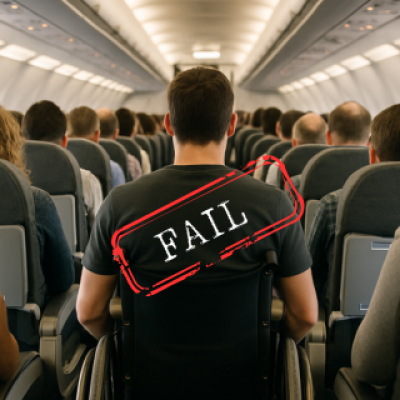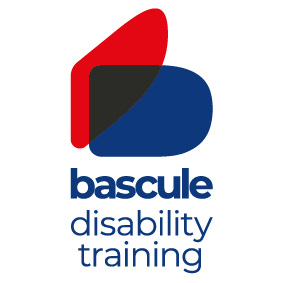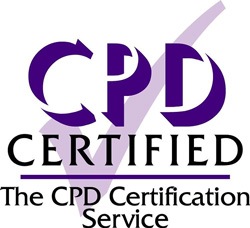What one United Airlines flight taught me about accessibility failures

As a wheelchair user that flies regularly, I have come across many challenges in my time. From negotiating limited access to toilets to receiving wheelchair damage from heavy handed baggage staff.
Sadly, I’m not alone in experiencing these issues. Ask any wheelchair user about their time flying, and they will be the first to tell you that the industry is quite far behind when it comes to accessibility. (If you need further convincing take a look at the amazing documentary Fight to Fly by Sophie Morgan, that reports, via hidden camera, the terrible experiences of disabled travellers– but more about Sophie’s efforts later…)
Whilst I have become relatively accustomed to the poor standards of most airlines, my most recent flight left me feeling a new level of indignation, through an experience that could have been far less humiliating if the staff had as much as a simple level of disability awareness.
I boarded a United Airlines flight from Los Angeles to Newark, having booked a first-class ticket. Now, I will point out, that when I book first class it is not as a matter of luxury or status, but simply because I need the space, and for me, economy is an impossibility.
I had to book a last-minute flight to attend the memorial of a dear friend and as such took the only seat remaining, which happened to be a window seat. Whilst not the easiest for me, I reasoned that I could manage or that someone would swap with me so that they didn’t have to move every time I needed the toilet. Unfortunately, the gap between seats on this flight was so small that I couldn’t get my body into it . And, if I was, by some miracle, able to get to it, it would be an enormous struggle to get out, and using the toilet would be very disruptive, time consuming and I’d have to do the impossible once again on my return!
When I politely pointed this out to a crewmember, I was hoping that a simple seat exchange would be possible. The crewmember and I decided, therefore, that the best option was to sit on the aisle seat next to mine, in hopes that the passenger who had booked it would be an upstanding citizen, and willing to help.
But, no such luck.
When the passenger boarded, they had a very simple perspective on the situation. They bought an aisle seat because they wanted one, and now they expect to have it. Next, staff quietly asked several people in surrounding seats if they would swap, but there were no takers for said trade.
As my options diminished, the pressure fell upon me to at least try and get into the window seat as the take off was now becoming increasingly delayed. The pressure and tension was palpable and the attention of all other passengers was on me, which was frankly quite unpleasant.
I tried my best to get to the window seat, and after a minute of struggling, exhausted and humiliated, I gave up, having successfully demonstrated to the crewmember, (and all observing passengers), that occupying an aisle seat was not a preference, it was a necessity.
The airline staff then huddled together and formulated Plan C, which was in essence, to re-approach the surrounding passengers, this time incentivising them with points, treats and airmiles to convince them to swap their aisle seats. Only, the airline staff didn’t feel confident doing this themselves and cajoled their colleagues from the gate to do the pleading.
Now, like anyone, I value my dignity highly, and so sitting there, on display, while the crew performed a public auction to anyone in an aisle seat willing to swap, was excruciating. It was dehumanising and humiliating. I could also tell they were prepared to throw me off the flight if they could not convince someone to swap.
Eventually, enough compensation was offered for a passenger to switch seats (or perhaps they weren’t prepared to delay the flight any longer, who knows!), and whilst I felt relieved, I also felt embarrassed and shocked. I was shocked at how the issue was dealt with, at how I was made to feel like a ‘problem’, and was the cause of what was becoming a delay in taking off. It felt like the first time they were accommodating a person with a disability, and that not one single staff member had any real, true awareness of disability.
The solution to the issue was relatively simple, but I was made to feel like a burden as opposed to a customer, who had specific requirements which the airline had not met. I spent the remainder of the flight thinking about what could have been done differently in an event which had resulted in a huge, relatively unnoticed customer service failure.
For the record, I have not listed the flight number here because it is not my intent to get the crew of that flight into trouble, only a desire to all airline crew given better procedures as to what to do under these circumstances
What could have been done better?
[UPDATE - Since writing this blog, United Airlines have contacted me apologising and asking the question "How could we have done better?" The answers given were the same as listed in the blog. However, making contact, apologising and attempting to rectify any issues is a step towards progress, and having someone on their customer service team was appreciated.
Firstly, any information around accessibility and passengers which are wheelchair users should be handled with importance, with their needs correctly noted and considered during any seating arrangements (simple, I know).
The airline it appears had no policy for forcing a swap when it is required as I mentioned it when I got to the gate and they simply passed it off to flight crew. As a side note, flights in the United States make a big deal about meeting the requirements of an exit row seat (in the event of an evacuation you have to operate the door) and so people such as those with mobility difficulties cannot sit in those seats so they HAVE to reseat you, but that logic was not applied here.
I also, should never have been in a position where I felt I had to prove that the seat is not suitable, or be forced to attempt to do the impossible, as the pressure of the flight’s timing felt like it was entirely on my shoulders. I shouldn’t have had to explain in detail the limitations of my disability and certainly not prove them.
Finally, a public auction for incentives to swap with me should never have happened, especially not in a way where I was able to easily observe the communications between staff and passengers. As the problem was at least partly their fault, they should have taken control themselves and moved passengers as they required.
As someone that provides consultancy and training around disability and improving awareness, I firmly believe that many of these points could have been avoided with a simple foundation of disability awareness training.
This flight experience was quite timely considering that this week, the afore mentioned disability rights campaigner, Sophie Morgan wrote a piece for The Sunday Times, explaining that the UK government’s long-awaited report on access in air travel had failed. After nine months of consultation, the Government’s findings offer some suggestions, as opposed to proper legal channels of change, which Morgan rightly argues, is the problem.
The Government report highlights issues which passengers with disabilities have experienced for years, including, making passengers crawl up aisles to use toilets, leaving them boarded after the flight has landed, losing and damaging wheelchairs, having booking systems that are inaccessible, to generally failing to provide passengers with disabilities with a dignified experience of travel. However, the report published lacks any legal boundaries, deadlines, penalties, and mostly no accountability for airlines or airports. It simply offers vague recommendations at best.
In her article, Sophie makes one thing very clear. We don’t need more polite promises and loose guidelines. We need legislation, enforcement and the development of awareness and respect.
Until then, the fight to fly with dignity continues.



